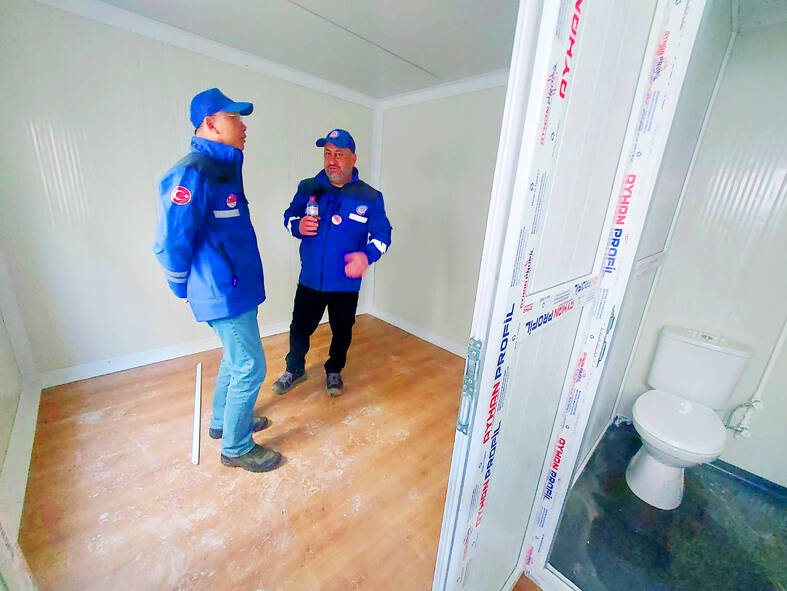Taiwan is working with a nonprofit humanitarian organization in Turkey to provide mobile health clinics for people in earthquake-stricken areas there, the Taipei Economic and Cultural Mission in Ankara said.
Ten mobile clinics are to be set up in neighborhoods in Hatay Province, an area that was hit hard by the magnitude 7.8 earthquake that struck Turkey and Syria on Feb. 6, the representative office said on Thursday.
A memorandum of understanding for the project was on Thursday signed by Representative to Turkey Volkan Huang (黃志揚) and a representative of Turkey’s Association for Solidarity with Asylum Seekers and Migrants (ASAM), it said.

Photo courtesy of Taipei Economic and Cultural Mission in Ankara via CNA
Under the memorandum, Taiwan is to work with ASAM to provide medical assistance to quake victims, mainly by providing mobile health clinics in rural areas where medical resources are not easily accessible, Huang said.
ASAM staff member Mehmet Salih Demirel said that the mobile clinics are being constructed from shipping containers, with three being used for each clinic.
Containers would also be remodeled as rest shelters for medical personnel and as offices for local health officials, Demirel said.
Taiwan has already donated 65 containers to ASAM, the representative office said, adding that the Turkish Ministry of Health would supply the medical equipment for the mobile clinics.
ASAM general coordinator Ibrahim Vurgun Kavlak thanked Taiwan for its support, saying that it was the first country to help Turkey, before “all the other international organizations and actors.”
“We feel the support of the Taiwanese government and Taiwanese people in many different fields, from education to health, from psycho social support to humanitarian aid,” he said.

A preclearance service to facilitate entry for people traveling to select airports in Japan would be available from Thursday next week to Feb. 25 at Taiwan Taoyuan International Airport, Taoyuan International Airport Corp (TIAC) said on Tuesday. The service was first made available to Taiwanese travelers throughout the winter vacation of 2024 and during the Lunar New Year holiday. In addition to flights to the Japanese cities of Hakodate, Asahikawa, Akita, Sendai, Niigata, Okayama, Takamatsu, Kumamoto and Kagoshima, the service would be available to travelers to Kobe and Oita. The service can be accessed by passengers of 15 flight routes operated by

MORE FALL: An investigation into one of Xi’s key cronies, part of a broader ‘anti-corruption’ drive, indicates that he might have a deep distrust in the military, an expert said China’s latest military purge underscores systemic risks in its shift from collective leadership to sole rule under Chinese President Xi Jinping (習近平), and could disrupt its chain of command and military capabilities, a national security official said yesterday. If decisionmaking within the Chinese Communist Party has become “irrational” under one-man rule, the Taiwan Strait and the regional situation must be approached with extreme caution, given unforeseen risks, they added. The anonymous official made the remarks as China’s Central Military Commission Vice Chairman Zhang Youxia (張又俠) and Joint Staff Department Chief of Staff Liu Zhenli (劉振立) were reportedly being investigated for suspected “serious

ENHANCING EFFICIENCY: The apron can accommodate 16 airplanes overnight at Taoyuan airport while work on the third runway continues, the transport minister said A new temporary overnight parking apron at Taiwan Taoyuan International Airport is to start operating on Friday next week to boost operational efficiency while the third runway is being constructed, the Ministry of Transportation and Communications said yesterday. The apron — one of the crucial projects in the construction of the third runway — can accommodate 16 aircraft overnight at the nation’s largest international airport, Minister of Transportation and Communications Chen Shih-kai (陳世凱) told reporters while inspecting the new facility yesterday morning. Aside from providing the airport operator with greater flexibility in aircraft parking during the third runway construction,

American climber Alex Honnold is to attempt a free climb of Taipei 101 today at 9am, with traffic closures around the skyscraper. To accommodate the climb attempt and filming, the Taipei Department of Transportation said traffic controls would be enforced around the Taipei 101 area. If weather conditions delay the climb, the restrictions would be pushed back to tomorrow. Traffic controls would be in place today from 7am to 11am around the Taipei 101 area, the department said. Songzhi Road would be fully closed in both directions between Songlian Road and Xinyi Road Sec 5, it said, adding that bidirectional traffic controls would